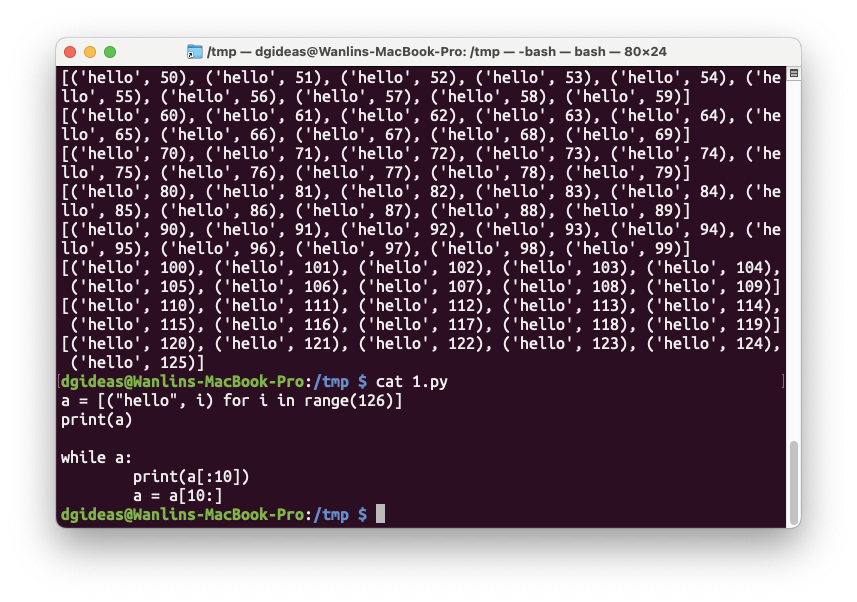推荐学习书目
› Learn Python the Hard Way
Python Sites
› PyPI - Python Package Index
› http://diveintopython.org/toc/index.html
› Pocoo
值得关注的项目
› PyPy
› Celery
› Jinja2
› Read the Docs
› gevent
› pyenv
› virtualenv
› Stackless Python
› Beautiful Soup
› 结巴中文分词
› Green Unicorn
› Sentry
› Shovel
› Pyflakes
› pytest
Python 编程
› pep8 Checker
Styles
› PEP 8
› Google Python Style Guide
› Code Style from The Hitchhiker's Guide
这是一个创建于 1337 天前的主题,其中的信息可能已经有所发展或是发生改变。
代码如下
def test():
a = []
for i in xrange(1,126):
ii = tuple(['hello',i])
a.append(ii)
if len(a) == 10:
print a
del a[0:]
else:
continue
test()
执行结果如下
[root@xxxx wodee]# python aa.py
[('hello', 1), ('hello', 2), ('hello', 3), ('hello', 4), ('hello', 5), ('hello', 6), ('hello', 7), ('hello', 8), ('hello', 9), ('hello', 10)]
[('hello', 11), ('hello', 12), ('hello', 13), ('hello', 14), ('hello', 15), ('hello', 16), ('hello', 17), ('hello', 18), ('hello', 19), ('hello', 20)]
[('hello', 21), ('hello', 22), ('hello', 23), ('hello', 24), ('hello', 25), ('hello', 26), ('hello', 27), ('hello', 28), ('hello', 29), ('hello', 30)]
[('hello', 31), ('hello', 32), ('hello', 33), ('hello', 34), ('hello', 35), ('hello', 36), ('hello', 37), ('hello', 38), ('hello', 39), ('hello', 40)]
[('hello', 41), ('hello', 42), ('hello', 43), ('hello', 44), ('hello', 45), ('hello', 46), ('hello', 47), ('hello', 48), ('hello', 49), ('hello', 50)]
[('hello', 51), ('hello', 52), ('hello', 53), ('hello', 54), ('hello', 55), ('hello', 56), ('hello', 57), ('hello', 58), ('hello', 59), ('hello', 60)]
[('hello', 61), ('hello', 62), ('hello', 63), ('hello', 64), ('hello', 65), ('hello', 66), ('hello', 67), ('hello', 68), ('hello', 69), ('hello', 70)]
[('hello', 71), ('hello', 72), ('hello', 73), ('hello', 74), ('hello', 75), ('hello', 76), ('hello', 77), ('hello', 78), ('hello', 79), ('hello', 80)]
[('hello', 81), ('hello', 82), ('hello', 83), ('hello', 84), ('hello', 85), ('hello', 86), ('hello', 87), ('hello', 88), ('hello', 89), ('hello', 90)]
[('hello', 91), ('hello', 92), ('hello', 93), ('hello', 94), ('hello', 95), ('hello', 96), ('hello', 97), ('hello', 98), ('hello', 99), ('hello', 100)]
[('hello', 101), ('hello', 102), ('hello', 103), ('hello', 104), ('hello', 105), ('hello', 106), ('hello', 107), ('hello', 108), ('hello', 109), ('hello', 110)]
[('hello', 111), ('hello', 112), ('hello', 113), ('hello', 114), ('hello', 115), ('hello', 116), ('hello', 117), ('hello', 118), ('hello', 119), ('hello', 120)]
问题如下
如果能保证最后一个长度不够的列表也能够打印出来?基于上面的代码改造
1
leorealman OP 请路过的大佬指点一二,多谢了
|
2
F281M6Dh8DXpD1g2 2022 年 6 月 19 日 via iPhone
第一个 for 下面写 else
|
3
irisdev 2022 年 6 月 19 日
不写 python
if len(a) == 10 => if len(a) == 10 or i == 126 - 1 |
4
ranleng 2022 年 6 月 19 日
def chunks(lst, n):
for i in range(0, len(lst), n): yield lst[i:i + n] def test(): arr = [("hello world", i) for i in range(126)] for i in chunks(arr, 10): print(i) test() |
5
leorealman OP @irisdev 还有更好的方法嘛?我不太希望使用 126 - 1 这个来判断这是最后一轮循环
|
6
Muniesa 2022 年 6 月 19 日
|
7
DGideas 2022 年 6 月 19 日 ```
a = [("hello", i) for i in range(126)] print(a) while a: print(a[:10]) a = a[10:] ``` 上边这样就行了,Python2 的话,记得把 range 改成 xrange |
8
DGideas 2022 年 6 月 19 日
|
10
lianjin 2022 年 6 月 19 日
|
11
ClericPy 2022 年 6 月 19 日
参考 slice_into_pieces slice_by_size
https://github.com/ClericPy/torequests/blob/master/torequests/utils.py#L397 试过其他几种, 这个速度最快, 原理想不起来了, 从老外那抄的 |
12
UrsulaTucker 2022 年 6 月 19 日
|
13
leorealman OP 多谢各位大佬指点
|
14
zvDC 2022 年 6 月 19 日
xs = [[('hello', x * 10 + y) for y in range(1, 11)] for x in range(12)]
|
15
GlobalNPC 2022 年 6 月 19 日
```python
def slice_list(raw_list, size): slice_num = len(raw_list) // size if len(raw_list) % size > 0: slice_num += 1 sliced_list = [raw_list[(i-1)*size : i*size] for i in range(1, slice_num+1)] return sliced_list if __name__ == "__main__": print(slice_list(list(range(1,101)), 19)) ``` |

